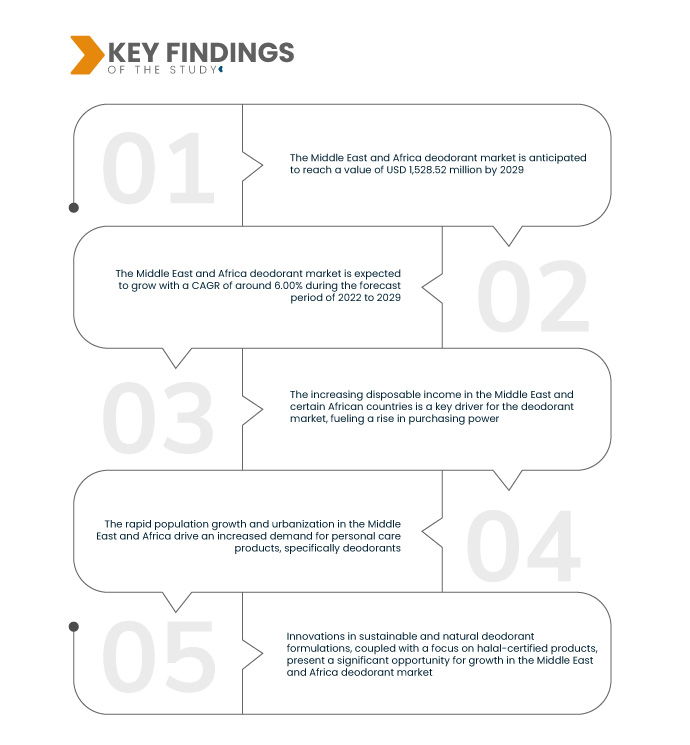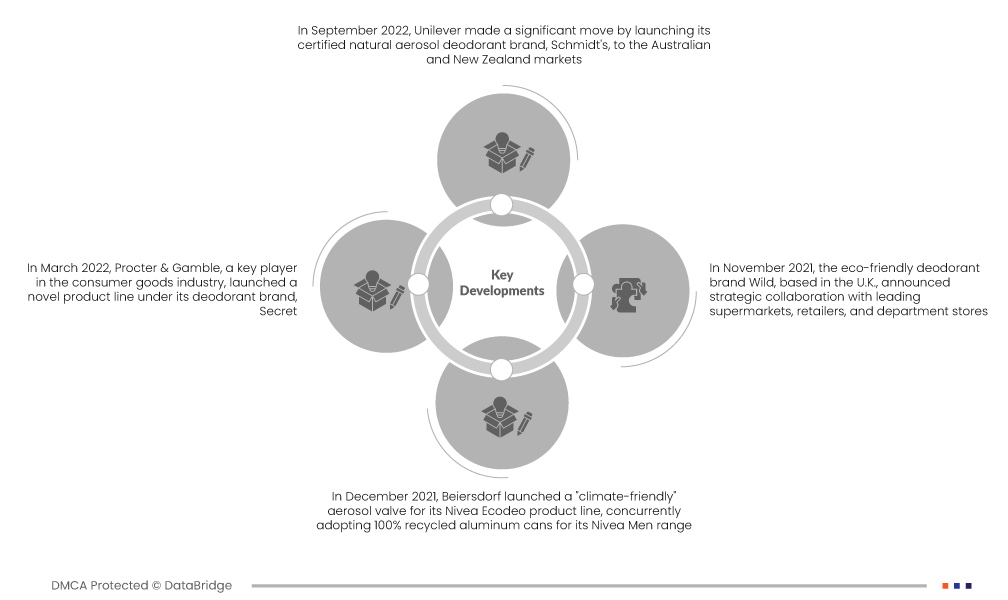На динамичном рынке дезодорантов текущие инициативы по исследованиям и разработкам стимулируют заметные инновации в формулах. Компании стратегически разрабатывают дезодорирующие продукты, уделяя особое внимание длительной эффективности, используя передовые технологии для улучшения защиты от пота и запаха. Приоритет отдается благоприятным для кожи ингредиентам, удовлетворяя спрос потребителей на продукты, которые нежны для кожи. Кроме того, наблюдается тенденция к многофункциональным формулам, предлагающим преимущества, выходящие за рамки базового контроля запаха, такие как увлажнение и питание кожи.
Полный отчет доступен по адресу https://www.databridgemarketresearch.com/reports/middle-east-and-africa-deodorant-market
Data Bridge Market Research анализирует рынок дезодорантов Ближнего Востока и Африки , который оценивался в 959,01 млн долларов США в 2021 году и, как ожидается, достигнет 1 528,52 млн долларов США к 2029 году, регистрируя среднегодовой темп роста в 6,00% в прогнозируемый период с 2022 по 2029 год. На Ближнем Востоке и в Африке повышенная осведомленность о личной гигиене подпитывает всплеск практик ухода за собой. Этот культурный сдвиг придает фундаментальное значение ежедневным процедурам ухода за собой, что приводит к повышению спроса на дезодоранты как на важнейший компонент личной гигиены в этих регионах.
Основные выводы исследования
Ожидается, что рост рынка будет обусловлен увеличением числа маркетинговых кампаний и стратегических инициатив по брендингу.
На рынке дезодорантов Ближнего Востока и Африки динамичные маркетинговые кампании и стратегические инициативы по брендингу служат ключевыми драйверами. С быстрым ростом населения, ростом располагаемых доходов и ростом урбанизации потребители становятся более осведомленными о брендах. Компании, инвестирующие в эффективные маркетинговые начинания, используют культурные идеи и предпочтения для создания резонансных кампаний, способствуя лояльности к бренду. Влияние мировых стандартов красоты в сочетании с разнообразной потребительской базой региона побуждает производителей дезодорантов адаптировать свой брендинг для удовлетворения конкретных потребностей. Эффективное повествование, поддержка знаменитостей и цифровой маркетинг способствуют повышению осведомленности потребителей, стимулируя принятие продукта и рост рынка.
Область отчета и сегментация рынка
Отчет Метрика
|
Подробности
|
Прогнозируемый период
|
2022-2029
|
Базовый год
|
2021
|
Исторические годы
|
2020 (Можно настроить на 2014-2019)
|
Количественные единицы
|
Доход в млн. долл. США, объемы в единицах, цены в долл. США
|
Охваченные сегменты
|
Тип продукта (спрей, кремы, шариковый аппликатор, другие), канал сбыта (супермаркеты/гипермаркеты, магазины шаговой доступности, аптеки, интернет-магазины, другие), упаковочный материал (металл, пластик, другие), конечный пользователь (мужчины, женщины, другие)
|
Страны, охваченные
|
ОАЭ, Саудовская Аравия, Египет, Южная Африка, Израиль, остальной Ближний Восток и Африка
|
Охваченные участники рынка
|
Unilever (Великобритания), Procter & Gamble (США), Henkel AG & Co. KGaA (Германия), L'Oréal (Франция), Beiersdorf (Германия), group.loccitane (Франция), AVON PRODUCTS (Великобритания), Elsa's Skincare (США), SPEICK Natural Cosmetics (Германия), Weleda (Швейцария), Laverana GmbH & Co. KG (Германия), EO Products (США), IndU.S. Valley (Индия), Lavanila (США), Sebapharma GmbH & CO. KG (Германия), Calvin Klein (США), Burberry plc (Великобритания), REVLON (США), Dior (Франция) и Giorgio Armani SpA (Италия)
|
Данные, отраженные в отчете
|
Помимо таких рыночных данных, как рыночная стоимость, темпы роста, сегменты рынка, географический охват, участники рынка и рыночный сценарий, рыночный отчет, подготовленный командой Data Bridge Market Research, включает в себя углубленный экспертный анализ, анализ импорта/экспорта, анализ цен, анализ потребления продукции и поведения потребителей.
|
Анализ сегмента:
Рынок дезодорантов Ближнего Востока и Африки сегментирован по типу продукта, каналу сбыта, упаковочному материалу и конечному пользователю.
- По типу продукции рынок дезодорантов Ближнего Востока и Африки сегментируется на спреи, кремы, шариковые дезодоранты и другие.
- На основе каналов сбыта рынок дезодорантов Ближнего Востока и Африки сегментируется на супермаркеты/гипермаркеты, магазины шаговой доступности, аптеки, интернет-магазины и другие.
- По типу упаковочного материала рынок дезодорантов на Ближнем Востоке и в Африке сегментируется на металл, пластик и другие.
- По признаку конечного потребителя рынок дезодорантов Ближнего Востока и Африки сегментируется на мужской, женский и другие.
Основные игроки
Data Bridge Market Research признает следующие компании основными игроками на рынке дезодорантов на Ближнем Востоке и в Африке: Unilever (Великобритания), Procter & Gamble (США), Henkel AG & Co. KGaA (Германия), L'Oréal (Франция), Beiersdorf (Германия), group.loccitane (Франция), AVON PRODUCTS (Великобритания), Elsa's Skincare (США), SPEICK Natural Cosmetics (Германия), Weleda (Швейцария), Laverana GmbH & Co. KG (Германия)
Развитие рынка
- В сентябре 2022 года компания Unilever сделала значительный шаг, выведя на рынки Австралии и Новой Зеландии свой сертифицированный натуральный аэрозольный дезодорант Schmidt's. Этот запуск ознаменовал собой стратегическую попытку предложить потребителям в этих регионах новый, экологически безопасный вариант дезодоранта. Сопровождая запуск, Unilever сотрудничала с независимым креативным агентством Emotive для разработки первой в истории бренда кампании. Целью кампании было повышение осведомленности о Schmidt's, подчеркивая его натуральную сертификацию и уникальные качества.
- В марте 2022 года компания Procter & Gamble, ключевой игрок в индустрии потребительских товаров, запустила новую линейку продуктов под своим дезодорирующим брендом Secret. Компания запустила в США коллекцию Secret Weightless Dry Spray, включающую как антиперспиранты, так и дезодоранты без алюминия. Эта коллекция, доступная в четырех различных ароматах — дикая роза, ваниль, белый персик и водяная лилия с аргановым маслом, — призвана удовлетворить разнообразные предпочтения потребителей, предлагая при этом легкое и эффективное решение
- В декабре 2021 года Beiersdorf запустила «экологически чистый» аэрозольный клапан для своей линейки продуктов Nivea Ecodeo, одновременно перейдя на 100% переработанные алюминиевые банки для своей линейки Nivea Men. Beiersdorf, ключевой игрок в индустрии ухода за кожей, продемонстрировала свою приверженность устойчивому развитию, внедрив экологически чистые методы в свои линейки продуктов Nivea. Этот стратегический сдвиг в сторону экологически устойчивой упаковки, особенно для дезодорантов и гелей для бритья на европейском рынке, продемонстрировал приверженность Beiersdorf решению экологических проблем и соответствию меняющимся предпочтениям потребителей.
- В ноябре 2021 года бренд экологически чистых дезодорантов Wild, базирующийся в Великобритании, объявил о стратегическом сотрудничестве с ведущими супермаркетами, розничными торговцами и универмагами. Этот шаг был направлен на расширение присутствия Wild на рынке Великобритании. Создавая альянсы с ключевыми игроками в секторе розничной торговли, Wild стремился сделать свои устойчивые и экологически безопасные дезодоранты более доступными для потребителей, что соответствовало растущему спросу на экологически чистые средства личной гигиены.
Более подробную информацию об отчете о рынке дезодорантов на Ближнем Востоке и в Африке можно получить здесь – https://www.databridgemarketresearch.com/reports/middle-east-and-africa-deodorant-market












